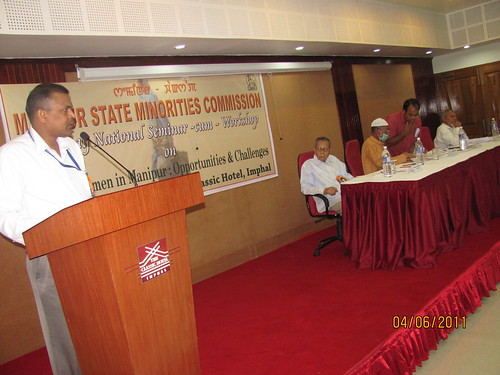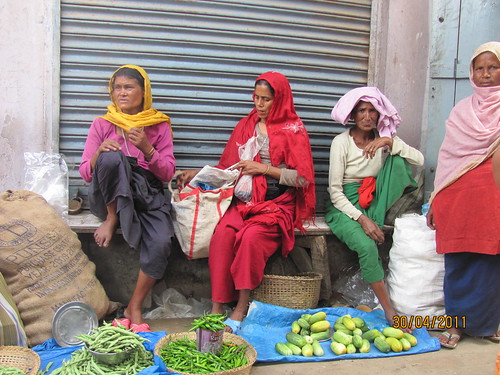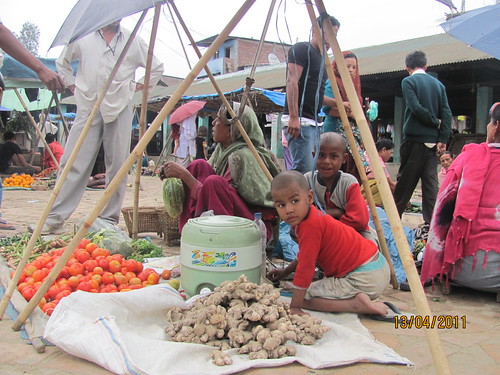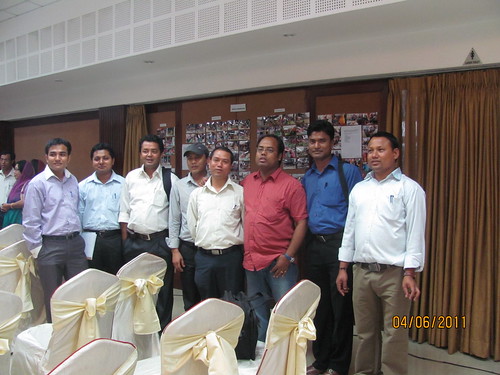By: Dr. Syed Ahmed,
A one-day seminar-cum-workshop on the topic, “Muslim Women in Manipur: Opportunities and Challenges” was organized by the Manipur State Minorities Commission on June 05, 2011 at the Classic Hotel in Imphal.
The Cabinet Minister for Minorities and Other Backward Communities, Government of Manipur, Md. Alaudin Khan graced the function as Chief Guest. The Deputy Secretary, Ministry of Minority Affairs, Government of India, M.A. Imam and Principal Secretary, Labour and Employment, Government of Manipur, A.R. Khan, IAS, attended the function as Guests of Honour. The Chairperson of the Manipur State Minorities Commission, A. Halim Choudhury, IAS (Retd.) presided over the function.

Deputy Secretary, Ministry of Minority Affairs, M.A. Imam speaking at the seminar
The Chief Guest Md. Alaudin Khan inaugurated a photo exhibition. The photos reflected the woes of the Manipuri Muslim women street vendors. Some of the photos from the exhibition are reproduced here:

Muslim women street vendors along with their young children putting their stalls

Muslim women street vedors

A Muslim women street vendor and her children

A group of Muslim vendors putting their stalls at a street corner
A short documentary film, “Hello Mother,” was also screened. The film, made by the Secretary of Manipur State Minorities Commission Md. Raheijuddin Sheikh, narrates the struggles of the Muslim women street vendors in Manipur.
The seminar was attended by some of the prominent Muslims of Manipur, which included young bureaucrats, college teachers, doctors, social activists, political leaders and research scholars.
Minister Md. Alauddin Khan, in his speech, asserted that both the Central and State Government are committed to uplifting the status of the minorities. He highlighted some of the policies and programs that his ministry has taken up for the uplifting of the Muslims in the state and assured the audience that he will try his level best to implement the recommendations that come from the seminar. Alaudin Khan, realizing the importance of research in framing developmental policies and programs, also reiterated the need for organizing such seminars regularly to discuss the various issues that Muslims confront in the state.
A.R. Khan appreciated the economic role of the Muslim women in Manipur and expressed the need for tapping their capabilities. Deputy Secretary M.A. Imam informed the audience about various schemes, including the Multi-Sectoral Development Plan (MsDP), taken up by the Ministry of Minority Affairs for the welfare of Muslims, and the new scholarship schemes introduced for minority students. He also talked about the need for social audit in the implementation process of the various schemes and programs for the minorities.
The seminar had two technical sessions in which papers were read out by resource persons. In the first technical session, papers were presented on the topic of Muslim women and education. Dr. Janatun Begum, a senior lecturer of Manipur College, discussed the causes for poor accessibility of modern education by Muslim women. Dr. Janatun cited poverty, engagement of girls in household work, more emphasis given to the education of boys, the tradition of early marriage, and the absence of girls’ hostels as some of the major causes for the poor access to education by Muslim girls.
Dr. Seheratun Nisa, a lecturer of the Oriental College, suggested in her paper that free education and an incentive scheme, a separate school for girls, a program to motivate girl’s parents, the modernization of madrasa education, remedial coaching and a change in the curriculum as per local needs as some of the means to increase enrolment and reduce drop-out by Muslims girls in schools.
Feroja Syed, a young lecturer of the Modern College, Imphal, identified some of the problems that the Manipuri Muslim women face in getting a modern education in her paper. Dr. Maqbul Ali, a former student of Omeo Kumar Das Institute of Social Change, Guwahati, analyzed the social challenges that Muslim women face in educational advancement in his paper. Ali stated that Manipuri Muslim women bear the brunt of social challenges like dowry, polygamy, divorce, etc. which disturbs the family processes thereby strongly affecting education and overall development of the girl child. A Member of the Manipur State Minorities Commission, Majda Khan also read out a short paper highlighting the importance of educating Muslim girls in their empowerment process.
In the second technical session, Dr. Syed Ahmed (the author of this article) presented a paper on Manipuri Muslim Women in the Unorganised Sector. The paper highlighted the plight of the Manipuri Muslim women street vendors. Deputy Secretary M.A. Imam spoke about the importance of research and survey in formulating planning processes for the welfare of minorities. Dr. M. Baharuddin Shah, another young lecturer of G.P. Women’s College, discussed the threat that Muslim women face against the dreaded HIV/AIDS disease in Manipur and the various reasons for their vulnerability. Dr. Mohd Shakil Ahmed, a researcher, read a paper which foregrounded the general parameter of challenges facing the Muslim women in Manipur. Besides highlighting the parameter, Shakil Ahmed’s paper reflected the challenges poor Muslim women face in order to make their living. He emphasised the need for collecting comprehensive data on all aspects of Muslim women and taking affirmative action based on the analysis of the data collected, to ensure that economic and educational empowerment go together.

Some of the paper presenters and invitees
The President of the seminar, A. Halim Choudhury, presented the recommendations at the end of the technical sessions. The recommendations included: inclusion of a separate sub-plan for Muslim women in the proposed sub-plan (of Planning Commission) for Muslims in the XIIth Plan, framing a state policy for Manipuri Muslim women working in the unorganised sector, ensuring Muslim women working in the unorganised sector easy access to bank loans and health facilities, building market sheds at commercially viable areas in Muslim inhabited areas of Manipur, introducing Kasturba Gandhi Balika Vidyalaya schemes in Muslim inhabited areas of Manipur, relaxation in the admission process of colleges and Manipur University for Muslim students to encourage Muslim students towards higher education.

